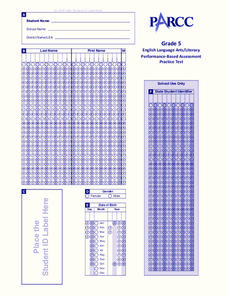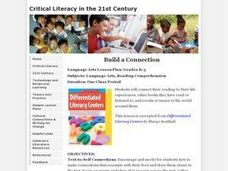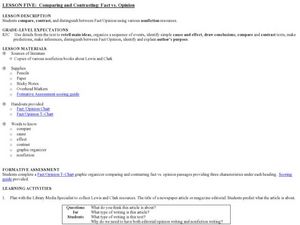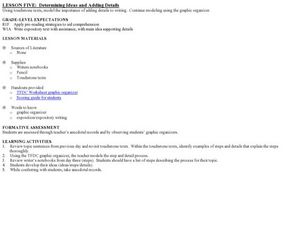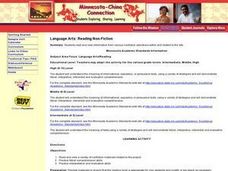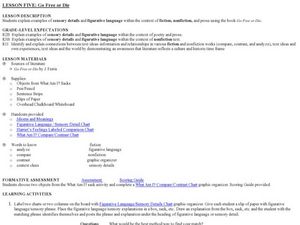Read Works
Signal Words in Expository Text
Signal words are one way that authors make the relationships between their ideas clear. Allow your learners the chance to investigate cause and effect in texts by identifying signal words. They locate and analyze cause-and-effect...
Polk Bros Foundation
How to Summarize a Non-Fiction Passage
After reading a text, one way to find out how much your class comprehended is to ask your pupils to summarize. This worksheet helps class members prepare for writing a summary of a nonfiction text. They note down the topic, up to eight...
Curated OER
Compare and Contrast Nonfiction Texts
Explore nonfiction writing by comparing and contrasting two different texts. After reading two nonfiction books, articles, or magazines, students utilize a graphic organizer to record their similarities and differences. They answer study...
Syracuse City School District
Summary of Fiction and Non-Fiction Text
Somebody Wanted But So Then (SWBST)? Yes! Here's a great strategy for teaching young readers how to summarize narrative text. In addition, the packet includes exercises that show kids how to summarize nonfiction text using the classic...
Curated OER
Reading Comprehension Practice: Nonfiction Text
Pupils practice their reading comprehension. In this reading comprehension lesson, students read or listen to a nonfiction article about meditation. This lesson includes discussion questions and comprehension questions.
Polk Bros Foundation
Meet the Nonfiction Main Idea Challenge
Help your class develop the ability to determine a main idea with a packet of materials that you can introduce and use over a period of time. The packet includes some information for the teacher and rationale for the exercises. There are...
Curated OER
Using Details From The Text
Begin this expository writing activity by reading a non-fiction book of your choice and modeling expository writing. The plan suggests The Trip of a Drip by Vicki Cobb but notes that other texts will work. Learners then choose a...
Curated OER
Performance-Based Assessment Practice Test (Grade 5 ELA/Literacy)
Check in on the development of your fifth graders' reading and writing skills with this Common Core-designed assessment. Given a series of six reading passages ranging from narrative stories to informational texts, young learners answer...
DePaul University
Settlement
Early settlers in the American Midwest experienced constant struggle. This reading passage describes for young learners the hardships of homesteaders as they journeyed west and sought to start a new life. When finished, students identify...
DePaul University
Egypt
The country of Egypt is more than just big pyramids and ancient pharaohs. After reading a brief overview of this African nation, young learners will demonstrate their understanding of the text by identifying the main idea and supporting...
Curated OER
Paraphrasing and Summarizing
Read an article about the migration of our ancestors and write a paragraph. Pupils paraphrase and summarize to restate the information found in a nonfiction text. They write a shortened version of the reading to demonstrate the...
Curated OER
Nonfiction Text elements
Students research Lewis and Clark and use the information for a book. In this Lewis and Clark instructional activity, students gather information and complete worksheets in an activity to write a book. Students use a variety of text...
Great Schools
Different Types of Writing
What type of writing is this? Learners read a brief introduction to various types of text: instructions, explanations, poems, folk tales, novels, informative, and arguments. The introduction doesn't explain these, so consider going over...
Curated OER
Build a Connection
Learners discuss their personal connections with stories they've read in the past and identify techniques to connect with more stories. They create illustrations, construct task cards, and complete sentence stems based on books they read...
Curated OER
Comparing and Contrasting: Fact vs. Opinion
Elementary schoolers investigate nonfiction stories by analyzing facts and opinions. They read nonfiction stories about the Lewis and Clark expedition. Pupils utilize a T-chart to list the facts and opinions on opposite sides, and then...
Curated OER
Historical Agency in History Book Sets (HBS)
Study historical events by combining the study of historical fiction and non-fiction. Learners read about true past events in historical fiction novels and then research non-fiction accounts of the same events. What are some differences...
Curated OER
Cattle Drive
Students explore cattle drives. In this United States history and letter writing lesson, students write a letter to their family predicting possible problems that were encountered by participants in cattle drives. Students design brands,...
Curated OER
Comprehension-Note Taking Skills to Supprt Opinions and Panel Discussion
Fifth graders examine note taking skills in order to support opinions. In this language arts lesson, 5th graders read several newpaper articles and discuss a current issue. Students explore how to paraphrase so as not to commit plagiarism.
Curated OER
Ask Questions About a Topic
Students explore reading comprehension by completing a graphic organizer. In this journalism technique lesson, students discuss important questions they can ask about stories they read to improve comprehension. Students identify keywords...
Teaching Tolerance
Community Newsletter
What does it take to develop and publish a newsletter? Young academics create a newsletter with original artwork for their school or community. They explore social justice themes and spread messages of tolerance and inclusion. Scholars...
Curated OER
Determining Ideas and Adding Details
A handy TFDC (topic/fact/detail/conclusion) graphic organizer (included) allows young writers to outline and record their main ideas and supporting details in the prewriting phase. They then continue to add details to the topic sentences...
Curated OER
Language Arts: Reading Non-Fiction
Learners read and view information sent from seven high school students who travel to China. The daily reports that they send back to the weblog section of the site should be of high interest to learners in Minnesota.
Curated OER
Go Free or Die: Figurative Language
Figures of speech, sensory details, and academic language are all targeted while reading Chapter Two of J. Ferris’ Go Free or Die. First, learners engage in an exercise to practice describing with detail. Then, partners use a chart to...
Curated OER
Pre-writing activities for improving students' connections to literature
Learners, while reading a novel together in class, jot in their journals any connections to their own lives they can make between the text and self, text to text or text to the world. Various themes are connected to open more doors to...









